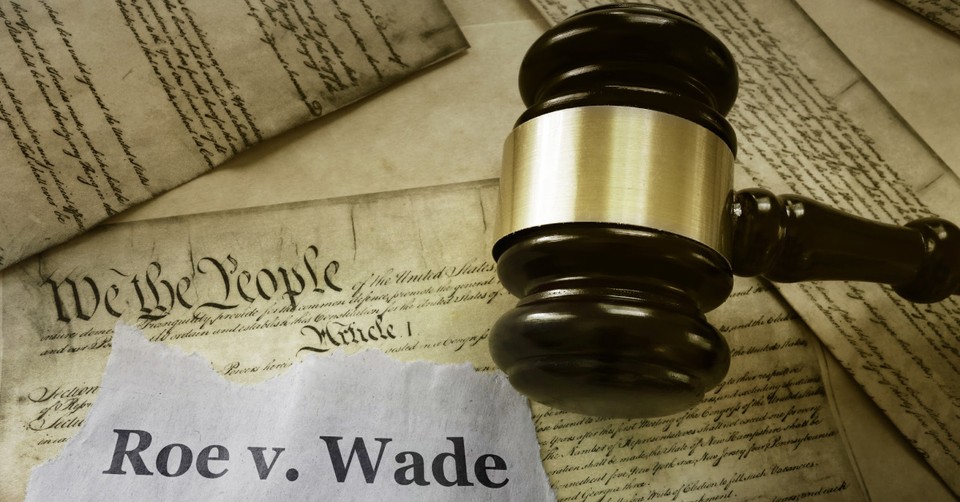How to Process Your Emotions on Roe v. Wade Whether You're Pro-Life or Pro-Choice

“Oh wow. SCOTUS just overturned Roe v Wade. I am [a speechless emoji].”
Scanning this text was how I learned about the landmark decision the Supreme Court released today. A fellow staff member sent a group text to all of us staff. Today is the second day of our 3-day intensive.
Four other members immediately texted back revealing where they stood: “devastated.” “Awful.” The assistant trainer appeared visibly anguished.
As for me, the ruling to let each state decide on whether to decriminalize abortion caused a slew of emotions to press forward, rendering me unable to stay fully present for the training. I can name at least a handful of different emotions rolling in and out of my awareness throughout the day.
Abortion evokes strong emotions.
Even for Christians.
Because of this fact, it’s probable that you will hear from others in your world—or the world—who express a view that directly contradicts yours.
I invite you to ponder the following thoughts, especially if you’re aware of your own big emotions in the wake of this decision.
Why?
Because emotion moves us to motion. Strong feelings, especially when they’re unprocessed, can quickly goad us to action. Yet, behavior impacts us in a lasting way. Damages created by behavior are not easily remedied.
If we all take the time to understand where our strong reactions come from, it might make a difference as we all navigate the consequences of this monumental decision. Raging, blaming, lashing out, despair, hopelessness, gloating, mocking, or condescending reactions might easily trigger someone else to respond in a way that might throw fuel to the fire—which can easily create more division and destruction.
That’s why I’d like to submit the following for your consideration.
If You’re Pro-Choice
Allow your emotions to make themselves known. Sometimes it helps to name the amalgam of emotions you’re aware of. For instance, if you detect rage but also sadness, acknowledge both as having a legitimate place in your life. You can journal, paint, sing, take a walk, or cry. These activities may help you get in touch with your feelings.
But please refrain from taking mind-altering substances or engaging in any self-destructive act. They will only serve to suppress important feelings. Nothing beneficial ever comes from denying your emotions their right to exist.
When you feel ready to do a slightly deeper work, ask these feelings to give you the room to listen to them one at a time. In my experience, rage, anger, or other similar emotions tend to demand our attention first, so go ahead and let your anger inform you anything it wants you to know about the SCOTUS decision.
If you sense that the angry part has shared everything it’d like to share, validate it. Let it know that you understand.
Once the anger calms down, it’s likely that you might feel more access to sadness, despair, or any other vulnerable feelings. If it feels safe to do so, go ahead and let yourself sense these more fragile feelings. Gently ask them to share the impact of today’s ruling on them.
It’s possible that your strong stance on wanting to keep abortion legal stems from personal reasons. It’s also possible that some of these reasons are attached to shame. For this and many other reasons, be gentle with yourself when you get to this tender territory.
If your introspection reveals areas in which you can benefit from emotional healing, please reach out. Click here for help with suicidal thoughts. Find a good therapist here, or a Christian one here.
You also have the option to ask the Lord to comfort you. He is the Prince of Peace and Wonderful Counselor (Isaiah 9:6). If you have the energy and interest, ask Him what He thinks about today’s ruling. This prompt alone may spark the start of a journey of deepening your intimacy with the Savior.
If You’re Pro-Life
You might feel overjoyed by today’s decision because years of praying, crying, and maybe even fasting for the Supreme Court to overturn Roe v Wade have finally paid off.
Maybe you can justify your joy by using Scripture. You stake your life on the Bible being a pro-life book. Welcome the opportunity to rejoice in the Lord, especially when so many heartbreaking news have dominated the news cycles recently.
But please rejoice while being kind to others—including those who don’t share your sentiments.
SCOTUS momentous decision evokes weighty emotions. You may not understand why anyone (especially those who confess Christ as Lord) can condone abortion, but do you have the generosity of heart to show compassion for those who are genuinely struggling?
I don’t know all the gut-wrenching reasons behind why people believe the way they do. My intention in highlighting one possible reason is to, hopefully, help you approach pro-choicers with a soft heart.
Some people are adamant about being pro-choice because they have been raped or have a loved one who survived it. The aftermath of being so sexually violated is devastating enough to the victim’s psyche, but if a pregnancy resulted because of it, to be told they can’t abort the baby can incite suicidal thoughts. Being forced to keep that pregnancy might make it feel like their body is being taken hostage yet another time.
It’s not just rape survivors who might react this way. Those with a childhood abuse background might find their old wounds triggered. Children don’t have the choice to escape their caregivers when the latter doled out painful or unfair treatments. (This power differential is what makes child abuse possible.) When these children grow into adults, they’re sensitive to the issue of choice, particularly when they see themselves trapped in an awful predicament.
Scripture admonishes us to mourn with those who mourn (Romans 12:15). Be sensitive to those around you who may grieve SCOTUS decision. Please don’t gloat. As best as you can, stay away from criticizing or demonizing them. If you remain open-hearted and interested in understanding the opposite side’s reaction, you may just earn a tiny access to befriend them.
The Lord can use this access to further ministry opportunities.
Our Impact on Others
Whichever camp you feel you identify the strongest with, please bear in mind the huge difference between feeling your feelings and expressing them. As a psychologist, I will never advocate against acknowledging feelings—no matter what they are.
However, beware of elevating feelings to action.
A huge gulf spans validating your own feelings (letting them know they are valid) versus expressing them to someone other than yourself. Our words impact others—especially when they’re accompanied by powerful non-verbals like yelling, cursing, or animated hand gestures. Someone might react in an equally forceful way that might easily trigger us, which might escalate our emotional intensity, which might cause both parties to spiral out of control.
The Holy Spirit’s injunction in Philippians 2:4 seems apropos for today: “Let each of you look not only to his own interests, but also to the interests of others” (ESV).
Is there a better time to practice the “royal law” of loving our neighbor as ourselves (James 2:8) than now, as our nation is processing this historic decision?
Photo Credit: ©Getty Images/Zimmytws

Originally published June 24, 2022.





